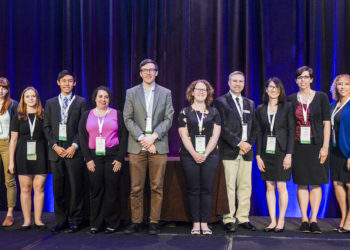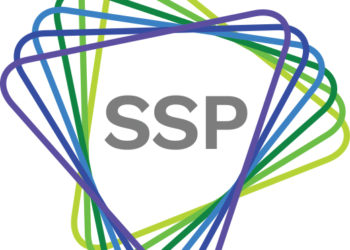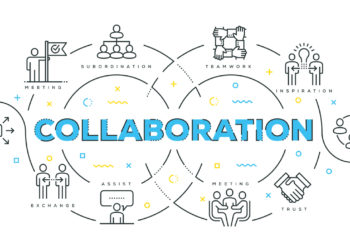This year several of the Scholarly Kitchen Chefs became roving reporters, as they asked delegates at the Society for Scholarly Publishing (SSP) Annual Meeting to share their opinions, observations, and general impressions of the meeting and of the SSP itself.
We spoke to a couple dozen attendees. Most were delegates. Some were speakers. They included a few people that have been involved with SSP for more than 20 years, as well as several attending their first meeting. There were librarians, editors, publishers, marketers, service providers, and software developers. Although not a scientific sampling by any means, interviewees were affiliated with society publishers (53%), commercial and not-for-profit service providers (23%), commercial publishers (18%), and libraries (6%).

Although we set out to ask them two questions, we ended up starting conversations about other topics as well. Our initial questions were:
- How does engagement with SSP benefit you or your organization?
- What is your most significant takeaway from this year’s annual meeting?
More than half of the people with whom we spoke said that SSP Annual Meeting was the most important meeting of the year for them. Their reasons included networking, the programming, and because it’s a venue where different players in the scholarly communications ecosystem can interact. Some saw value in seeing their current and potential service providers, some mentioned how beneficial it was to interact with different people that had similar responsibilities to them, and others felt that the SSP Annual Meeting helped them see where they fit in.
“SSP is a great meeting-ground for different stakeholders in scholarly communication to exchange views and form productive relationships that can advance our common goals.” — Ivy Anderson, Director, Collection Development and Management, California Digital Library
“I was also so glad to make more personal connections from such an interesting and welcoming group; it’s especially helpful to meet ‘counterparts’ from other publishers with comparable discovery roles and to learn about similar discovery challenges other publishers are trying to work through.” — Abigail Wickes, Oxford University Press
“Our organization is growing and I am here to get more ideas about how we can grow and learn about what other publishers are doing. I want to connect with others in my field.” — Olivia Lanaham, North Carolina State University
“SSP creates so many spaces for dialogue for people in scholarly publishing from across the publishing ecosystem. Engagement with SSP provides a more expansive view of the industry and a more in depth understanding of how different stakeholders fit into it.” — Alexandra Frankel, American Anthropological Association
“The SSP meeting is unique in terms of who it brings together: societies, publishers, libraries, institutions, and data repositories, and that means there are always fresh perspectives. The program also brings new technology to the community and insights into the future.” Grace Baynes, Springer Nature
“SSP has provided me with opportunities for networking with a wider community of publishers. For Learned Publishing, this has also meant access to a more extensive pool of potential authors, reviewers, and readers.” — Pippa Smart, PSP Consulting; Learned Publishing, journal of the Association of Learned & Professional Society Publishers / Society for Scholarly Publishing
“It’s great to be at a conference where I actually understand and am interested in what people are talking about. I love how collegial it is here — people very openly answering each other’s questions, and sharing experiences. It’s great to meet other people who do what I do.” — Jade Holt, Institute Of Physics (IOP)
“As a librarian who was in publishing, I’m struck by the rich intersection between publishers and libraries. This is a great space for innovation – for example, the sessions on Open Access, Data policies, and licensing. Libraries play a crucial role in working with researchers to help them navigate these issues.” Maria Gould, University of California Berkeley Library
Several had many practical items on their agenda. There were things they wanted to learn at the Annual Meeting, experiences they wanted to hear about and leverage in their own workplace, and general questions they wanted to address. Amy McPherson from the Botanical Society of America felt that it was an important time in the industry and she came to SSP interested in policy issues and to learn more about best practices. Interviewees were also interested in learning what might come next in scholarly communications.
“My expectations are to continue to find out about new and possibly better solutions to some of the common issues we all face such as discoverability of content, managing data, etc. Any useful information/practices that I can bring back to my organization is always a benefit.” — Damita Snow, American Society of Civil Engineers
“Engagement with SSP is critical for Ringgold, as it allows us to spend dedicated time surveying the landscape. The conference is a perfect opportunity to ask questions of folks we don’t normally see, explore new ideas, and refine our understanding of issues.” — Christine Orr, Ringgold
“As well as the networking, it’s the fact that I learn not just about what’s happening now but also about what’s just around the corner.” — Bob Pursell, American Society of Clinical Oncology (ASCO)
“[Key takeaway was] The growing importance of AI in our industry — it’s becoming more and more of a reality and a necessity — as well as the challenges it presents, for example in terms of replicating bias.” — Bob Pursell, ASCO
Several of the interviewees mentioned Dr. Safiya Umoja Noble’s keynote as one of the most impactful and thought-provoking sessions of the meeting or mentioned it as one of their most significant takeaways.
“Safiya Noble’s Annual Meeting keynote held a mirror up to us as individuals and as an industry. Conversations kicked off as to how we can be more diverse not only in our hiring and advancement but also in who we publish and give access to.” — Anne-Marie Green, Wiley
“My key takeaway from the Annual Meeting was the call to action in Safiya Noble’s talk, which I found extremely moving. She made me realize that we must move forward from well-intentioned talk about diversity, and begin taking action toward implementing change. She highlighted an urgent responsibility to commit to real engagement with the many disadvantaged groups in this community. This is the path toward shared understanding and collaborative action, and its time to walk it.” — Alison McGonagle O’Connell, Coko Foundation
“The biggest challenge that our industry faces is to be more inclusive and accessible for people with diverse backgrounds — “diverse” being a completely inadequate umbrella term. Of course part of the solution starts with policy changes, e.g., to improve early childhood education, but there are things that we can do within our industry to make science publishing more accessible to an ever growing and more diverse global population.” — Vincent Lizzi, Taylor & Francis Group
But, it’s always good to learn how we might improve. More diversity in session topics and focus as well as incorporating wider perspectives into the program were a couple of the suggestions raised.
“I’d like the participants to think that serving the scholarly community means challenging the very business models they are working on. If they really have the interest of the scholarly community in mind they have to be willing to challenge themselves to operate under a different premise that isn’t profit oriented.” — Juan Pablo Alperin, Public Knowledge Project at Simon Fraser University
“My takeaway from the conference is that although there were more books sessions than usual — which is great! — there’s still a need for more and, in particular, for more sessions geared towards smaller presses. More on best practices for organizations like mine would be really helpful both as part of the conference program and SSP’s other activities.” — Vivian Berghahn, Berghahn Books
If you were at the meeting and one of our roving reporters didn’t catch up with you, please let us know what you thought. I know I speak for SSP when I say, we hope your sentiment echos this one:
“This was my first SSP Meeting and I liked the size, quality and friendliness of the event. It was one of the best academic publishing meetings that I have attended. I will certainly be back.” — Richard Gallagher, President & Editor-in-Chief, Annual Reviews
Discussion
4 Thoughts on "Ask The Delegates: What Was Your Key Takeaway From The SSP Annual Meeting?"
Thanks Ann and the Chefs, some truly wonderful comments and feedback here !
Unfortunately I could not make it to Chicago, so these collected comments were very helpful. Thank you Ann and the roving reporters.
This was my second year at SSP, and I would echo the comments reported above. Dr. Noble’s keynote was one of the best I’ve ever attended. She provided a wealth of eye-opening information in an engaging and motivating way. Further, sessions addressing equity, accessibility, piracy, and discoverability were very relevant in my day to day. One of the best features was that they provided not only discussion but also real-world action items that we “can do on Monday.”
The comments above were wonderful to read. One of the most heartening things we talked about in the post-meeting planning committee recap (besides LOTS of thanks and congratulations for the team’s hard work) was the value that managers were finding in sending their teams and direct reports to the meeting – it felt like a testament to the welcoming nature of the SSP community and its focus on developing both individuals and the industry. My only hope is that some of those first-time attendees were inspired to come back later for regional events or for committee work! It really is wonderful when the Annual Meeting can be not just a capstone but the start of something new.



